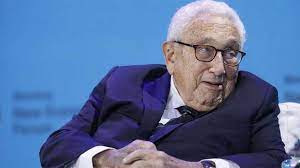Top US diplomat Kissinger, who made 1971 Pakistan-facilitated pathbreaking trip to China, dies

New York: Dr. Henry Kissinger, one of America’s most influential and controversial diplomats, whose 1971 secret trip to Beijing, facilitated by Pakistan, led to a breakthrough in China-US relations and a decisive shift in the global balance of power, died Wednesday at age 100.
Kissinger passed away at his home in the US state of Connecticut, according to a statement from his geopolitical consulting firm, Kissinger Associates Incorporated. No mention was made of the circumstances.
It said he would be interred at a private family service, to be followed at a later date by a public memorial service in New York City. Kissinger, who served as secretary of state and national security adviser under Presidents Richard Nixon and Gerald Ford, remained a prominent voice on foreign policy issues long after leaving government in 1977. At the request of ex-President Nixon, former Pakistan President Agha Mohammad Yahya Khan acted as a go-between the United States and China to promote normalization of their relations as they did not have formal diplomatic ties.
Washington then recognized the so-called “Republic of China”as the government of all China. That regime was set up by Chiang Kai-shek, whose troops fled to Taiwan in 1949 after the Chinese revolution. Since then there was great a deal of hostility between Beijing and Washington and US portrayed China as it’s enemy. Nixon chose Pakistan for the task as Islamabad was on good terms with both China and the United States. The whole operation was carried out by Gen. Yahya Khan, who had earned the trust of President Nixon and Prime Minister Zhou Enlai, with military precision, secrecy and deception.
When Kissinger landed in Pakistan in July 1971, he feigned a stomach problem and claimed he needed a few days to recuperate and was supposedly taken to Nathiagali — buying him the time he needed to get to China undetected. So secret was the operation that the then Pakistan’s Foreign Secretary Sultan Mohammad Khan personally drove Kissinger in a Volkswagen Beetle to the Rawalpindi’s Chaklala Airport at 3:30 a.m. for the flight in a PIA Boeing-707 to Beijing. The pilot, Captain M.T. Baig, was told about the destination of his VVIP flight once the plane was airborne. Kissinger and his team were unsure about how they would be treated in China, but when everything went well and the Chinese leadership extended an invitation to President Nixon, he sent a one-word cable to the White House “Eureka”. Not even Nixon’s Chief of Staff, Gen. Alexander Haig, could understand what the coded cable meant, but the president knew — he just smiled. On Kissinger’s return from Pakistan, Nixon broke the news about the breakthrough in the relations with China, saying he would pay a state visit in February 1972.
President Yahya was assisted by a two-man team of his top diplomats, Foreign Secretary Sultan Khan and Pakistan Ambassador to the US, Agha Hilaly. Kissinger also gained some infamy for his reported warning to Pakistan against developing nuclear weapons following the atomic test carried out by India in May 1974. The warning, which was accompanied by an offer to provide top-of-the-line military equipment, was conveyed at his October 1974 meeting with former Prime Minister Zulfikar Ali Bhutto. The offer was rejected by Bhutto. Elsewhere Kissinger negotiated America’s exit from the disastrous Vietnam War, sharing the 1973 Nobel Peace Prize with North Vietnam’s Le Duc Tho for a cease-fire agreement that year.
Nearly two years later, Nixon’s self-described “peace with honour” collapsed with the fall of Saigon to the Viet Cong during the administration of President Ford. Kissinger also crafted the détente policy that thawed the Cold War with the Soviet Union. Through his shuttle diplomacy, he wrung out agreements between Israel and Egypt in the wake of the Arab countries’ surprise launch of the 1973 War.





